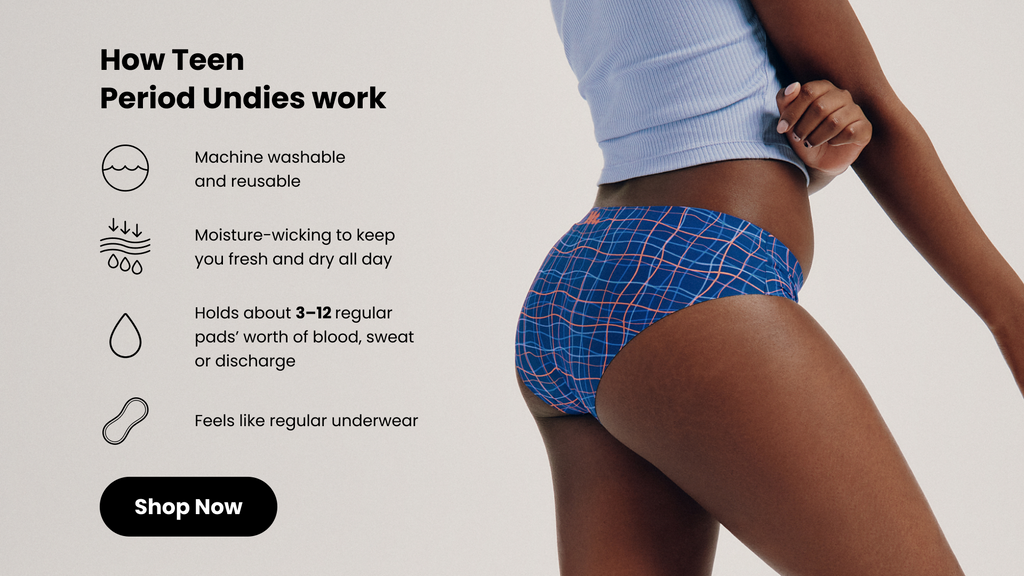Pop quiz: When should you expect your teen's first period?
*Aggressively loud buzzer noise*
Trick question! There is no “normal” age to get your first period, so knowing when to expect your teen's very first period isn't always clear. Bodies are all unique and different, and what might be considered the norm for one body can be totally different for another (download our free period guide to learn more). There are average age ranges to expect things like puberty, (and yes, a first period), but remember these are just averages. It doesn’t mean everyone is going to fit exactly within that range. There are a TON of factors that can play into when a body will decide it’s ready to begin puberty and start menstruation. Let’s talk about a few of them:
What is the average age to get your first period?
On average, people who menstruate have been getting their first period earlier than those throughout history. Today, the average age to get your first period is when you’re about 12 years old. In 1928, the average age for Americans to get their period was 13.9. In the 1950s and 60s, this number dropped to 13.5, then to 12.8 in the 1970s. Jumping waaay back in the history books, the average age for teens getting their first periods was even later. In the Victorian Era (the 1800s,) the average age was about 14, and during the Renaissance (1300s-1600s) the average age was about 16 years old.

So, I only need to be on the lookout for my teen's first period after my 12th birthday?
Ah, if only navigating puberty was that easy. As rude as it is, there’s no manual for how to navigate puberty, hormones, changing bodies, teenhood, or periods – including when to expect your child's first one. (Honestly, there isn’t even a manual for navigating adulthood. We really are all just out here.)
Remember, 12 is just an average age to get your first period. Some people might get their first period at ages 9, 10, or 11, others might get theirs at 13, 14, 15, or 16. In some circumstances, some people experience something called precocious puberty, which is when puberty begins before the age of 8 or 9.
Further reading: Learn more about what to expect from a medium flow period.
Why is the average age for first periods earlier than it used to be?
To be super honest, we don’t know for sure. However, scientists have a few hypotheses:
Obesity and early puberty
Last year, the World Health Organization stated obesity had nearly tripled since 1975, and 39 million children under the age of 5 were overweight or obese in 2020.
But what does obesity have to do with periods?
Estrogen is stored and produced by the fat cells in our bodies. So, an increase in fat cells naturally means more estrogen in the body. Estrogen is also one of the hormones that make the uterine lining thicken. When the lining thickens, it is ready for a fertilized egg. If there isn't a fertilized egg (AKA no pregnancy), it will begin to shed and voila: your teen gets their period.
Long story short, higher obesity rates in young people may be a reason the average age for puberty is beginning earlier. While every body is different and weight gain can be caused by a whole whack of reasons, a good rule of thumb for people at every age is to eat healthily, exercise plenty, and speak with a doctor if there are any concerns.
Environmental factors
Environmental factors may also be contributing to earlier starts of puberty. There isn’t a huge amount of data surrounding this theory, and the data that does exist isn’t entirely clear. However, we do know that we are all exposed to tons of different chemicals daily, mainly through the air, and they can speed up the puberty process–including welcoming a first period to the party.
Pollutants in the air are much more excessive than they used to be, (the ol’ horse and buggy didn’t exactly emit as much gas as a new SUV). There are also so many different kinds of pollutants in the air that scientists can’t pinpoint exactly which chemical might be causing periods to arrive earlier. (Just another reason why sustainable, green practices are the bee’s knees.)

Can stress cause periods to start earlier?
Chronic stress may also be linked to kick-starting puberty early. Chronic stress is perceived by the brain as a low-grade threat, which triggers the brain to start reproduction.
Chronic stress isn’t the same kind of stress that’s related to homework or friends (or an older sibling bugging them). While these things could play a part, chronic stress is when your teen feels pressured and overwhelmed for a long time. Something like parents going through a divorce might (but not always) be a trigger for chronic stress.
If your teen is going through something difficult or experienced something traumatic, harmful or abusive, they should always speak with someone they trust like a parent, teacher, or counsellor. They never have to suffer alone, no matter what they're going through–chronic stress or not.
Make sure you always have an open line of communication with your children. If you think something might be wrong, ask! Create a safe space where your child feels comfortable voicing their concerns and feeling heard.
What are the most common symptoms of a first period?
Some people experience their first period as a complete surprise. However, there are often indicators that it will arrive soon such as the formation of pimples, bloating and mood changes. Some general signs of puberty include body hair/pubic hair, breast development/fullness in the chest, and an increase in sweat. There are a few other key signs your period is coming, and plenty of pro tips to make sure your teen is prepared for when it does (including how to put in a tampon for the first time, and environmentally friendly period products).
Talking about periods
No matter when your child starts their first period, remember that what’s going on with their body is completely normal. It's also completely normal to talk about it! The first few years of navigating a period may feel like a whole new world, but your teens shouldn't feel like they're alone. They should have someone they trust to talk to about their period, such as a parent or guardian, health teacher at school, or friends and family.
Your family history may also play a big role in when your teen starts menstruating, so let them know your family history and what to expect. If you think something irregular may be going on, such as severe cramps, very heavy bleeding or other possible concerns, always be sure to talk to a doc.
Be ready for their first menstrual cycle
To be ready for anything, have them try wearing a pair of period underwear for teens so you won’t be caught off guard. And most importantly always remember, you've (both) got this!





